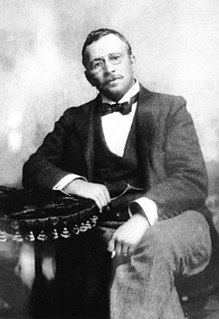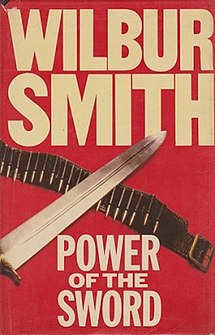De Beers Group is an international corporation that specialises in diamond mining, diamond exploitation, diamond retail, diamond trading and industrial diamond manufacturing sectors. The company is active in open-pit, large-scale alluvial, coastal and deep sea mining. It operates in 35 countries and mining takes place in Botswana, Namibia, South Africa, Canada and Australia.

Flintheart Glomgold is a cartoon character created in 1956 by Carl Barks. He is a South African Pekin Duck and the business rival of Scrooge McDuck, usually portrayed as an ambitious, ruthless, and manipulative businessman who shares many of the same qualities as Scrooge—the drive for massive wealth, and the cunning and creativity to obtain the same—but he lacks any of Scrooge's tendencies towards generosity and compassion. In Don Rosa's The Life and Times of Scrooge McDuck, he is said to be a Boer.

John Davison Rockefeller Sr. was an American business magnate and philanthropist. He is widely considered the wealthiest American of all time and the richest person in modern history.

Thomas "Diamond" Pitt of Stratford in Wiltshire and of Boconnoc in Cornwall, was an English merchant involved in trade with India who served as President of Madras and six times as a Member of Parliament. He was the grandfather of William Pitt, 1st Earl of Chatham and was great-grandfather of Pitt the Younger, both prime ministers of Great Britain.

Value investing is an investment paradigm that involves buying securities that appear underpriced by some form of fundamental analysis. The various forms of value investing derive from the investment philosophy first taught by Benjamin Graham and David Dodd at Columbia Business School in 1928, and subsequently developed in their 1934 text Security Analysis.

Alfred Beit was a Anglo-German gold and diamond magnate in South Africa, and a major donor and profiteer of infrastructure development on the African continent. He also donated much money to university education and research in several countries, and was the "silent partner" who structured the capital flight from post-Boer War South Africa to Rhodesia, and the Rhodes Scholarship, named after his employee, Cecil Rhodes. Beit's assets were structured around the so-called Corner House Group, which through its holdings in various companies controlled 37 per cent of the gold produced at the Witwatersrand's goldfields in Johannesburg in 1913.

Barney Barnato, born Barnet Isaacs, was a British Randlord, one of the entrepreneurs who gained control of diamond mining, and later gold mining, in South Africa from the 1870s. He is perhaps best remembered as being a rival of Cecil Rhodes.

Sir Julius Charles Wernher, 1st Baronet was a German-born Randlord and art collector who became part of the English establishment.

Lord of War is a 2005 American crime drama film written, produced, and directed by Andrew Niccol, and co-produced by and starring Nicolas Cage.

Thomas Williams was a Welsh industrialist and Member of Parliament. At the time of his death, he was the richest man in Wales.

Samuel Marks was a Lithuanian-born South African industrialist and financier.

The Mineral Revolution is a term used by historians to refer to the rapid industrialisation and economic changes which occurred in South Africa from the 1870s onwards. The Mineral Revolution was largely driven by the need to create a permanent workforce to work in the mining industry, and saw South Africa transformed from a patchwork of agrarian states to a unified, industrial nation. In political terms, the Mineral Revolution had a significant impact on diplomacy and military affairs. Finally, the policies and events of the Mineral Revolution had an increasingly negative impact on race relations in South Africa, and formed the basis of the apartheid system, which dominated South African society for a century.
David Nahmad is a Monegasque billionaire and former fine art dealer. A descendant of a Syrian Jewish art family residing in Monaco, he and his relations are perhaps the single biggest buying force in fine art.
By The Great Horn Spoon is a novel by Sid Fleischman, published in 1963. The story takes place in the California Gold Rush. A twelve-year-old boy named Jack, who has lived with his Aunt Arabella since his parents died, heads to California to search for gold after Aunt Arabella loses all her money. He is accompanied by Aunt Arabella's butler, Praiseworthy.
Dan Gertler is an Israeli billionaire businessman in natural resources and the founder and President of the DGI Group of Companies. He has diamond and copper mining interests in the Democratic Republic of the Congo (DRC) and has invested in iron ore, gold, cobalt, oil, agriculture, and banking. He may also hold citizenship of that country. As of 2015 his fortune was estimated at $1.26 billion by Forbes.
Giuseppe (“Joe”) Nahmad was an art dealer who specialized in impressionist, post-impressionist, and modern art. He amassed a multi-billion fortune in buying, selling, and collecting works of arts of 19th- and 20th-century artists.

Power of the Sword (1986) is a novel by Wilbur Smith set before and during World War II.

Securities market participants in the United States include corporations and governments issuing securities, persons and corporations buying and selling a security, the broker-dealers and exchanges which facilitate such trading, banks which safe keep assets, and regulators who monitor the markets' activities. Investors buy and sell through broker-dealers and have their assets retained by either their executing broker-dealer, a custodian bank or a prime broker. These transactions take place in the environment of equity and equity options exchanges, regulated by the U.S. Securities and Exchange Commission (SEC), or derivative exchanges, regulated by the Commodity Futures Trading Commission (CFTC). For transactions involving stocks and bonds, transfer agents assure that the ownership in each transaction is properly assigned to and held on behalf of each investor.

The Panama Papers are 11.5 million leaked documents that detail financial and attorney–client information for more than 214,488 offshore entities. The documents, some dating back to the 1970s, were created by, and taken from, Panamanian law firm and corporate service provider Mossack Fonseca, and were leaked in 2015 by an anonymous source.

Skeleton Coast is a 1987 South African made mercenary war film directed by John Cardos in the first of three films for producer Harry Alan Towers. It was the first of Towers' Breton Film Productions.















